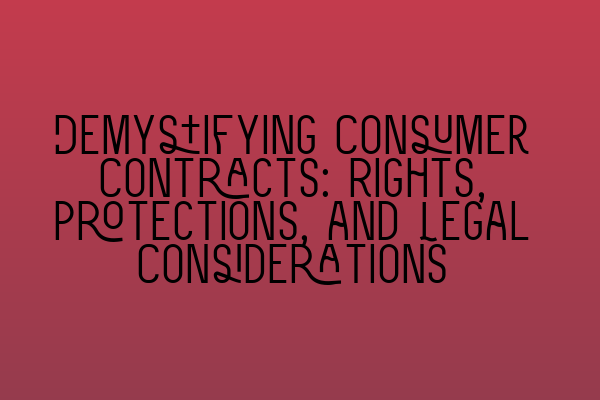Demystifying Consumer Contracts: Rights, Protections, and Legal Considerations
A consumer contract is a legally binding agreement between a business and an individual consumer, outlining the terms and conditions of a transaction. These contracts are an essential part of everyday life, governing various transactions such as purchasing goods or services, entering into agreements, and obtaining credit. Understanding consumer contracts is crucial to protect your rights and ensure a fair and equitable relationship with businesses.
Consumer Rights and Protections
Consumers in the UK are fortunate to have robust rights and protections when it comes to consumer contracts. These rights are provided under various legislation, including the Consumer Rights Act 2015, the Consumer Contracts (Information, Cancellation and Additional Charges) Regulations 2013, and the Unfair Terms in Consumer Contracts Regulations 1999.
One of the fundamental consumer rights is the right to receive accurate and clear information about the goods or services before making a purchase. This includes detailed product descriptions, pricing information, and any additional charges. The Consumer Contracts Regulations also give consumers the right to a ‘cooling-off’ period for most contracts made through distance selling, allowing them to change their minds and cancel the contract within a specified timeframe.
Additionally, the Consumer Rights Act 2015 provides protection against unfair contract terms or practices. It prohibits businesses from including terms that are deemed unfair, such as terms that exclude or limit liability for faulty goods or services. These provisions help to maintain a fair balance of power between consumers and businesses and ensure that consumers are not taken advantage of in contractual agreements.
It is essential for consumers to be aware of their rights and understand the protections afforded to them under consumer contract legislation. By familiarizing yourself with these rights, you can advocate for fair treatment and hold businesses accountable for any breaches of contract.
Key Considerations in Consumer Contracts
When entering into a consumer contract, there are several key considerations to keep in mind to protect your interests:
- Read and Understand the Contract: Always read the contract thoroughly before signing or agreeing to its terms. Pay attention to the details and ensure you understand all the provisions, rights, and obligations.
- Seek Legal Advice: If you are uncertain about any aspect of the contract, it is advisable to seek legal advice. A solicitor can review the contract and provide guidance on its implications and any potential risks.
- Negotiate and Amend: Consumer contracts are not always set in stone. If there are provisions or terms that you are uncomfortable with, discuss them with the other party and negotiate changes that align with your needs and expectations.
- Beware of Unfair Terms: Be vigilant for any clauses that may be considered unfair or unreasonable. Businesses cannot enforce unfair terms, and if you come across one, you should raise your concerns and seek resolution.
- Keep Copies and Documentation: It is essential to keep copies of all contracts, correspondence, and receipts related to the transaction. These documents serve as evidence in case of any disputes or disagreements.
By considering these factors, you can enter consumer contracts with confidence, knowing that you have taken the necessary precautions to protect your rights and interests.
Enforcing Consumer Rights
If you believe that your rights under a consumer contract have been breached, there are steps you can take to seek resolution. Initially, it is advisable to contact the business directly to discuss your concerns and try to resolve the matter amicably. If this does not result in a satisfactory outcome, you can escalate the issue by seeking assistance from a consumer protection organization, such as the Citizens Advice Bureau or the Trading Standards Service.
In some cases, litigation may be necessary to enforce your rights. However, before pursuing legal action, it is essential to weigh the costs and potential outcomes. Seeking legal advice from a solicitor can help you assess the strength of your case and guide you through the legal process.
Unveiling Real-Life Case Studies: Insights into Legal Practice and Decision-Making
Exploring Solicitor Salaries in the UK: Average Earnings and Factors Affecting Income
Mastering Client Relationship Management: Skills for Solicitors to Enhance Trust and Loyalty
Pursuing a Law School Education in the UK: Choosing the Right Path for Your Future
Securing Training Contracts: A Roadmap to Becoming a Solicitor
Now that you have a clearer understanding of consumer contracts, it is important to stay informed and updated on changes in consumer protection laws. This knowledge will empower you as a consumer and enable you to navigate contracts confidently and assert your rights.
DISCLAIMER: The information provided in this article is for general informational purposes only and does not constitute legal advice. For specific legal advice, it is recommended to consult with a qualified solicitor.
